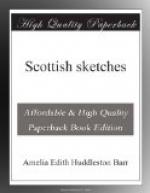Christine had never spoken in this way before to him; the majesty and purity of her character lifted him insensibly to higher thoughts, her gentleness soothed and comforted him. When David came in he found them talking in a calm, cheerful tone, and the evening that followed was one of the pleasantest he could remember. Yet James understood that Christine trusted in his forbearance, and he had no heart to grieve her, especially as she did her best to reward him by striving to make his visits to her father unusually happy.
So Donald married Miss Napier, and the newspapers were full of the bridegroom’s beauty and talents, and the bride’s high lineage and great possessions. After this Donald and Donald’s affairs seemed to very little trouble David’s humble household. His marriage put him far away from Christine’s thoughts, for her delicate conscience would have regarded it as a great sin to remember with any feeling of love another woman’s affianced husband; and when the struggle became one between right and wrong, it was ended for Christine. David seldom named him, and so Donald McFarlane gradually passed out of the lives he had so sorely troubled.
Slowly but surely James continued to prosper; he rose to be cashier in the bank, and he won a calm but certain place in Christine’s regard. She had never quite recovered the shock of her long illness; she was still very frail, and easily exhausted by the least fatigue or excitement. But in James’ eyes she was perfect; he was always at his best in her presence, and he was a very proud and happy man when, after eight years’ patient waiting and wooing, he won from her the promise to be his wife; for he knew that with Christine the promise meant all that it ought to mean.
The marriage made few changes in her peaceful life. James left the bank, put his savings in David’s business, and became his partner. But they continued to live in the same house, and year after year passed away in that happy calm which leaves no records, and has no fate days for the future to date from.
Sometimes a letter, a newspaper, or some public event, would bring back the memory of the gay, handsome lad that had once made so bright the little back parlor. Such strays from Donald’s present life were always pleasant ones. In ten years he had made great strides forward. Every one had a good word for him. His legal skill was quoted as authority, his charities were munificent, his name unblemished by a single mean deed.
Had James forgotten? No, indeed. Donald’s success only deepened his hatred of him. Even the silence he was compelled to keep on the subject intensified the feeling. Once after his marriage he attempted to discuss the subject with Christine, but the scene had been so painful he had never attempted it again; and David was swift and positive to dismiss any unfavorable allusion to Donald. Once, on reading that “Advocate McFarlane had joined the Free Kirk of Scotland on open confession of faith,” James flung down the paper and said pointedly, “I wonder whether he confessed his wrong-doing before his faith or not.”




